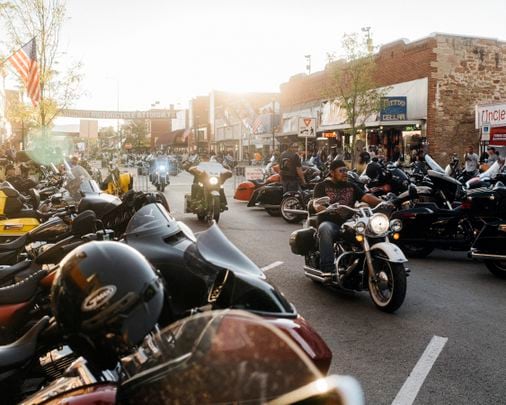The rallies provide a boost for local businesses – but also can bring many injured patients to hospital emergency departments because of an apparent increase in motor vehicle crashes associated with the events.
A few times a year, hundreds of thousands of motorcyclists converge on small towns for giant rallies. The most famous is the Sturgis Motorcycle Rally , held in August in South Dakota, but such events also take place in Florida, South Carolina, Arkansas, Texas and nearby in Laconia, N.H., where Laconia Motorcycle Week is scheduled for June.
Now, a study published Monday in JAMA Internal Medicine suggests another effect of motorcycle rallies: a concurrent increase in organ donations and transplants.
Advertisement
The researchers, from Harvard Medical School, see this finding as a call to action – first, to increase public safety, and, second, to improve education about organ donation in communities where the rallies are held, so that more of these unfortunate deaths can result in saving others’ lives.
“The scale of these events is really quite massive,” said Dr. David Cron, a Harvard Medical School clinical fellow in surgery at Massachusetts General Hospital, and the study’s lead author. “Sturgis, South Dakota, which is not the largest town, attracts about 500,000 people over the course of the eight-day-long event. So you can imagine the impact that might have on traffic systems and the population density during a short period of time.”
Anecdotes and some data show that traffic accidents, injuries and traffic-related deaths increase during these events, he said.
Cron’s team is apparently the first to examine whether the higher number of traffic-related deaths during motorcycle rallies affects the availability of organs for donation.
The researchers looked at the number of organ donations and transplants during the seven biggest rallies, and compared those numbers with donations during the four weeks before and after. They used data from the Scientific Registry of Transplant Recipients from March 2005 to September 2021.
Advertisement
Cron and his colleagues found a 21 percent increase in organ donors per day, and a 26 percent increase in transplants, during the motorcycle rallies. (Donors often give more than one organ.)
In practical terms, over a typical eight-day period, the region where a motorcycle rally is held sees on average nearly one additional organ donor whose death resulted from a motor vehicle crash.
Deaths from motor vehicle crashes account for just 11 percent of organ donations. So the increases associated with the rallies barely make a dent in the severe nationwide shortage of donated organs. The researchers found no reduction in waiting times for organs, or any evidence that doctors were able to move farther down the waiting list to the less severely ill during the rallies.
But the findings suggest the potential to do a better job at “translating unfortunate fatalities into a fortunate gift of life,” Cron said.
The organizations that procure organ donations, he said, should engage with the communities where motorcycle rallies take place. “Educational outreach activities really can go a long way in improving the public’s knowledge and perception of donation,” he said, “so that when there is a tragic death, it can, when possible, be turned into a gift of life.”
The Harvard researchers did not gather information about the number of deaths that occurred during rallies – or the number of potential donors who went to their graves without donating. “We see a 20 percent increase, [but] we can’t say yet, could that number be higher?” Cron said.
Advertisement
Cron emphasizes that the last thing anyone wants is for more people to die. But when deaths do occur, the hope is that more people will become donors.
Cron, who is also a research fellow at the Center for Surgery and Public Health at Brigham and Women’s Hospital, studies how events outside the transplant system influence the availability of donated organs. He became interested in the effects of motorcycle rallies when a colleague who had worked in New Hampshire described how the Laconia rally filled the local hospital with trauma patients.
“It’s important to recognize the potential of large-scale events like this to impact public health and to have downstream impacts on organ donation,” he said.
Dr. Francis Delmonico, chief medical officer of New England Donor Services, which oversees two organ banks, said his agency has not noticed any increase in donations in connection with the Laconia rally.
But he finds Cron’s work “important” and hopes it will come to the attention of rally organizers and motorcycle manufacturers like Harley Davidson. The rallies, he said, could be “the impetus for awareness” of opportunities for donation.
Jennifer Anderson, deputy director of Laconia Motorcycle Week, said the town and rally organizers put a great emphasis on safety, with added police presence and additional safety lights at sharp curves and other hazardous spots.
Advertisement
Motor vehicle deaths during the rally “are always tragic, but it’s also a rarity for the amount of people that come in,” she said.
She expressed skepticism that fatalities increase during the motorcycle rally any more than they do during snowmobile or ski season, which also attract thousands to the state. “You get a lot of people together, it’s one of the things that can happen,” she said.
Laconia Motorcycle Week attracts about 300,000 people, but not all stay in the town, which has a population of about 18,000 during the summer, Anderson said.
Asked whether rally organizers would be open to holding an organ-donation awareness campaign, she said, “Of course we would.”
Anderson, who is a psychology professor at Plymouth State University, said she is an organ donor, as well as a motorcyclist. “Educating people is right up my alley,” she said. “People should always consider organ donation,” especially if they engage in a risky sport.
Dr. Michael F. Daily, solid organ transplant section chief at Dartmouth Hitchcock Medical Center in Lebanon, N.H., said that, because organs are shared widely throughout the Northeast, his hospital “does not notice any significant difference in organ and tissue donation during motorcycle week.”
Daily said he was surprised by the extent of the organ donation increase found in the study.
“Common sense would suggest that events that bring together a crowd of people riding motorcycles would increase the chances of traffic accidents and trauma admissions,” he said in an e-mail. “The fact that a subset of motorcycle riders prefer not to wear a helmet suggests that some of these collisions may not be survivable. Still, the scale of the increase was surprising.”
Advertisement
He agreed with the study authors about the importance of educating the public about organ donation. But he cautioned that “there is the potential for this to appear insensitive in this context.”
“The best way,” he added, “is to continue to remind people of the importance of this life-saving choice to donate their organs in the face of any tragedy. … The list of people waiting for lifesaving organs continues to be much larger than the number of organs available. This makes the decision to donate organs a very important one for the public good. It can also provide some solace for the people you leave behind, that a part of you lives on.”
Felice J. Freyer can be reached at felice.freyer@globe.com. Follow her on Twitter @felicejfreyer.
Organ donations increase during huge motorcycle rallies, Harvard researchers find
RELATED ARTICLES




